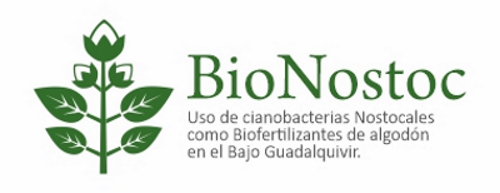
BIONOSTOC Operational Group: Use of Nostocales cyanobacteria as cotton biofertilizers in the Lower Guadalquivir
- Type Operational group
- Status In progress
- Execution 2023 -2025
- Assigned Budget 299.568,00 €
- Scope Autonómico
- Autonomous community Andalucía
The BioNostoc project is expected to demonstrate significant benefits from the use of cyanobacterial-based biofertilizers in cotton cultivation in the Lower Guadalquivir. Two selected strains of Nostocales cyanobacteria, native to the region, will be applied to cotton fields to enhance nitrogen fixation, reduce the use of synthetic fertilizers, and improve soil health. Increases in plant growth, root development, and overall yield are expected, providing a sustainable alternative to traditional fertilizers. The main practical recommendation for farmers is to incorporate these biofertilizers into cotton crop management.
By applying the product at planting and during the first irrigation, cotton growers can reduce the need for synthetic nitrogen fertilizers by up to 30%, which will lower production costs and environmental impacts, such as nitrate leaching into water bodies. Furthermore, the use of this natural fertilizer is expected to improve the resilience of cotton crops, making them more tolerant to stressful conditions such as drought.
For cotton industry professionals, this innovation offers a clear advantage: it helps comply with nitrate reduction regulations, ensures improved long-term soil fertility, and increases profitability through cost savings and improved crop yields. Furthermore, this biofertilizer utilizes local cyanobacteria strains, minimizing the risk of disrupting the soil's natural ecosystem and ensuring better adaptation to local conditions.
The BioNostoc project addresses the environmental and economic challenges arising from the excessive use of synthetic nitrogen fertilizers in cotton cultivation, particularly in the Lower Guadalquivir.
The project includes field trials in cotton crops using two strains of cyanobacteria as biofertilizers.
Activities include monitoring plant growth and soil microbiota, analyzing microbial populations using metagenomic techniques, and optimizing biofertilizer storage and application methods. The results will be disseminated through publications, field days, and events for interested parties.
This project arises in response to the intensive use of synthetic nitrogen fertilizers, which has contaminated aquifers and water bodies, especially in the Lower Guadalquivir region. European and national regulations limiting the use of synthetic fertilizers are driving the search for sustainable solutions, such as biofertilizers based on native microorganisms, which allow for more environmentally friendly agriculture.
The main objective is to reduce the use of synthetic fertilizers by introducing a cyanobacteria-based biofertilizer, which improves nitrogen fixation in the soil, increases plant growth, and reduces environmental pollution from nitrates.
An increase in plant growth, root development, and overall yield is expected, providing a sustainable alternative to traditional fertilizers. The main practical recommendation for farmers is to incorporate these biofertilizers into cotton crop management.
- Coordinator/entity name: AGROQUIVIR SCA DE 2º DEGREE
- Postal address: Ctra. Nacional IV, km. 573 s/n 41720, Los Palacios y Villafranca, Seville
- Coordinator/entity email: anasierra@agroquivir.es
- Telephone: 653807550
The BioNostoc project is aligned with European and national policies promoting sustainable agriculture, reducing the carbon footprint, and protecting water resources. The expected results will have a positive impact on cotton agricultural production in the region, improving environmental sustainability and soil and water quality.
The project's success will largely depend on farmers' willingness to adopt these innovative practices. A potential challenge will be the acceptance of new techniques, but demonstrating the environmental and economic benefits of biofertilizers could facilitate their implementation. Further research into the adaptation of these products to other agricultural and climatic conditions is recommended.
- AGROQUIVIR S.C.A. DE 2º GRADO
- ASAJA-SEVILLA (josefernando.robles@asajasevilla.es)
- CSIC-IBVF (vicente.mariscal@ibvf.csic.es)
- COCEREALES S.L. (vguillen@cocereales.com)
- AGROQUIVIR S.C.A. DE 2º GRADO







